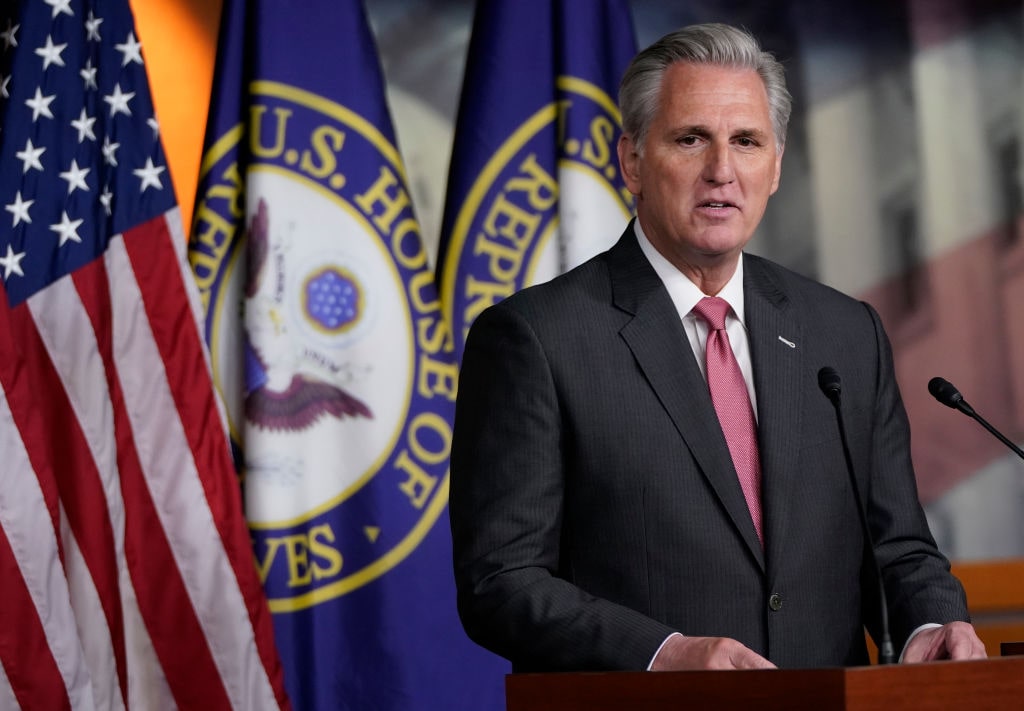As the vote draws nigh, threats to the speakership grow.
As the 119th Congress gets started today, January 3, House Speaker Mike Johnson (R-LA) prepares to run the gavel gauntlet again. In the days leading up to the vote, threats to his speakership seemed to multiply – and a new proposed rule drives the wedge deeper between Johnson and congressional Democrats, all but guaranteeing they won’t come to his rescue. Can the Louisiana lawmaker grasp the gavel once again, or will his seat atop the conference be usurped?
Johnson Imperiled
Mike Johnson almost immediately earned the ire of certain Freedom Caucus Republicans in the House for working across the aisle with Democrats on legislation to keep the government funded – the very same offense that led to McCarthy’s ouster. To them, these compromise bills gave away too much, and they felt he didn’t fight for their ideas.
As his speakership continued throughout the rest of the 118th, the situation only got worse. When Rep. Marjorie Taylor Greene (R-GA) called a vote to vacate the chair in May of 2024, ten other Republicans voted with her to remove the speaker. Now, some are saying they want “at minimum, assurances” on “meaningful cuts” to spending before supporting his re-election, Rep. Ralph Norman (R-SC) told Axios. Norman, along with Reps. Lauren Boebert (R-CO), Thomas Massie (R-KY), and a handful of others either want Johnson to prove himself to them or have vowed not to vote for him.
With an incoming majority of 219-215, Johnson doesn’t have many votes to lose. The math doesn’t seem likely to work out in his favor unless he can pull some support from Democrats. Unfortunately for him, he burned that bridge – somewhat ironic, too, since that’s the very “bridge” he crossed to work with the Democrats enough to upset some of his fellow Republicans.
Majority Rule – A Double-Edged Sword
In a 36-page list of changes to the rules of the 118th Congress that includes removing the House DEI office, Republicans propose amending the rules for vacating the speakership. For most of American history, a single member – from either party – could call for a vote to vacate. Once the vote is held, of course, a simple majority of the whole House is needed. That all changed in 2019 when Democrats took control and changed the rules so that such a motion could only be introduced by either the House Democratic Caucus or the House Republican Conference. Either party could do so, regardless of which held the chamber, but it had to be the party itself, meaning a majority of that party’s members had to support it.

Kevin McCarthy (Photo by Win McNamee/Getty Images)
When Kevin McCarthy (R-CA) was elected speaker, part of the deal was going back to the single-member rule. That famously backfired on him, of course, when a member of his party – former Rep. Matt Gaetz (R-FL) – called a vote to vacate. While most Republicans supported McCarthy, enough splintered off behind Gaetz that, along with the Democrats, they were able to remove McCarthy.
The new proposed rule would require a member of the majority party to initiate the process, and there would have to be eight other co-sponsors as well – also from the majority party. So, in other words, nine Republicans could trigger a vote to oust Johnson should he win again, but no number of Democrats speaking in unison could. As one might imagine, Democrats are not pleased with this suggestion.
The House Speaker Saga Continues
But this rule change could come back to bite Johnson (or whoever else ends up being speaker) as well – and not just in the 119th Congress. While no number of the minority party could force a vote to vacate, the biggest threats to Johnson are from his party. When McCarthy was ousted, it was a fellow Republican who led the charge. Johnson then faced his own vote to vacate, and enough Republicans signed on to that to remove him had it not been for support from the Democrats – support he almost certainly won’t see again. Assuming he wins the gavel once more today – or sometime in the near future if the first round of voting doesn’t do the trick – he won’t really be any safer.
Johnson survived Greene’s attempt to give him the boot, but only because of Democratic support. At the time, ten other Republicans voted alongside Greene to remove Johnson from leadership. Two things about this: First, 11 votes from the majority party would suffice under the new rule. Second, had the Democrats stood united against Johnson as they did against McCarthy – and as they almost certainly will now – those 11 GOP votes would easily see him removed.
Johnson’s future is already uncertain enough without interparty hard feelings. But even if he does manage to come out on top again for the speakership, this rule seems to offer no real security to the speaker, and all for the low, low price of completely alienating the other side of the aisle and probably ending any chance of bipartisanism in the 119th Congress.
Liberty Nation does not endorse candidates, campaigns, or legislation, and this presentation is no endorsement.

